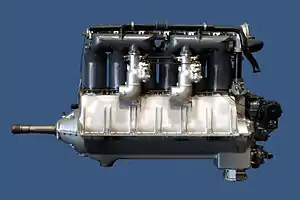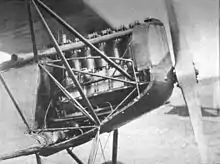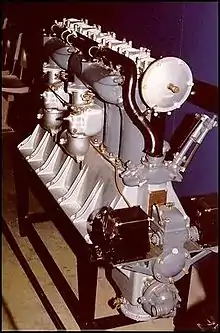Liberty L-6
The Liberty L-6 was a six-cylinder water-cooled inline aircraft engine developed in the United States during World War I.
| Liberty L-6 | |
|---|---|
 | |
| Liberty L-6 aircraft engine on display at the National Museum of the United States Air Force | |
| Type | Piston aero engine |
| National origin | United States |
| Manufacturer | Wright Aeronautical, Thomas-Morse Aircraft |
| Designer | Jesse G. Vincent and Elbert J. Hall |
| First run | about 1917 |
| Major applications | Engineering Division TW-1 |
| Number built | 52 |
| Variants | Liberty L-4, Liberty L-8, Liberty L-12 |
Design and development

The Liberty L-6, which developed 200–215 hp, was built by the Thomas-Morse Aircraft Corp. and Wright Aeronautical Corp. Since it was based on the same engine design as the more successful Liberty L-12 V-12 liquid-cooled aviation engine, the L-6's resemblance to the Mercedes D.III German aviation engine, the source for the Liberty V-12's own cylinder and valvetrain design, resulted in the American L-6 engine design bearing a close visual resemblance to the German straight-six aviation powerplant in a number of respects, with at least one L-6 even being mounted postwar into a captured Fokker D.VII fighter for testing in the US. The Liberty L-6's smaller displacement of some 825 cu. in. (13.5 liters) versus the late-war German Mercedes D.IIIaü's 903 cubic inches (14.8 liters) do not seem to have handicapped the American straight-six design, however, as the "Liberty Six" possessed a 5.42:1 CR, while the D.IIIaü had only a 4.64:1 CR, explaining a good bit of the American powerplant's output level—in addition to the 735.5 watt level for German Pferdestärke metric horsepower, versus the then solely-American-based SAE organization's standard of almost 746 watts per one horsepower.
Since the L-6 was too large for mail airplanes and other engines were available, the L-6 was canceled after only 52 had been built. In 1920 10 more L-6 engines were ordered, designated L-825, several of which were installed in the Curtiss PN-1, (only two built), and the Engineering Division TW-1, (only six built).
Hall-Scott also produced a six-cylinder engine using Liberty L-12 components, as the Hall-Scott L-6.
Specifications

General characteristics
- Type: Six-cylinder inline piston engine
- Bore: 5.00 in (127 mm)
- Stroke: 7.00 in (177.8 mm)
- Displacement: 824.67 in³ (13.51 litres)
- Dry weight: 567.5 lb (257.4 kg)
Components
- Valvetrain: SOHC (Single overhead cam)
- Fuel system: Twin updraft Stromberg N.A.-S5 carburetors
- Cooling system: Water-cooled
Performance
- Power output: 215 hp (162.6 kW) @ 1,700 rpm
- Compression ratio: 5.42:1
- Fuel consumption: 0.49 lb/HP-hour
- Oil consumption: 0.0256 lb/HP-hour
See also
Comparable engines
Related lists
References
This article incorporates text from Liberty L-6, a public domain work of the United States Government.
- Gunston, Bill (1986). World Encyclopedia of Aero Engines. Wellingborough: Patrick Stephens. p. 106.